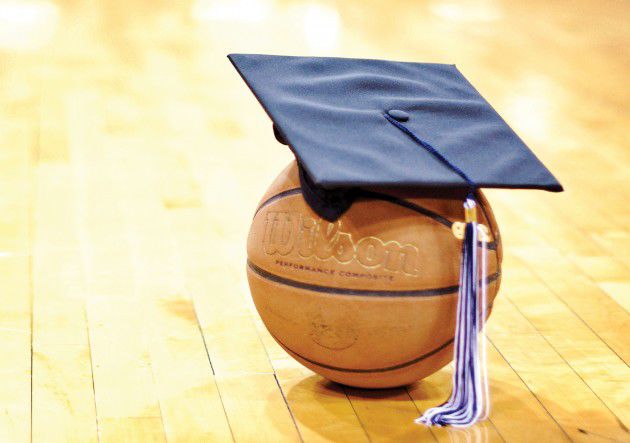University stands out in NCAA tournament debate over student-athlete graduation rate
March 24, 2010
With 16 teams left in the 2010 NCAA tournament, a debate is stirring about the graduation rates of student athletes.
U.S. News Weekly writers Ben Miller and Marc Isenberg recently authored articles debating whether colleges and universities with low athletic graduation rates should be allowed to participate in the NCAA basketball tournament.
In the battle about what the term “student-athlete” means, the NCAA maintains that college athletics are simply college athletics and not the equivalent of minor league sports, meaning that they should still be held to some academic standard. U.S. Secretary of Education Arne Duncan supports the plan to penalize schools whose teams do not meet the required 33 percent graduation rate, believing that they should not be eligible for the NCAA tournament.
In his article, Miller reported that the NCAA’s Academic Progress Rate plan, if enacted, would have made 10 teams ineligible for the 2009 tournament. The Wildcats, however, would not have been one of those teams. According to Amy Morgan, associate director of Academic Support, Villanova’s most recent graduation success rate is 96 percent, which reflects the rates during the 1999-2002 period. Miller reported that the University’s graduation rate in 2009 was 92 percent.
“In addition [to academic advising provided by the Colleges], Villanova’s Office of Academic Support for Athletes provides student athletes several programs to help them be successful, including a freshman mentoring program and a tutoring program,” Associate Vice President for Academic Affairs Craig Wheeland said.
The Academic Progress Rate plan would keep some, but not all, of the teams out of the tournament. It can be argued that it would not be devastating to the tournament itself, as both Villanova and last year’s champion, North Carolina, would have still qualified for the tournament.
However, according to Robert Schlesinger’s March 18 article in U.S. News Weekly, number one seed Kentucky, with a 31 percent graduation rate, would have been one of 12 teams not eligible for the tournament this year.
In addition to prohibiting teams from participating in the tournament, an important component of this rule is that it would encourage schools and student-athletes to take more steps to prepare academically for life after their sports careers come to an end.
Most student-athletes will not become professionals in their respected sports, and the services provided to them by their schools can help them prepare for careers.
“Very, very few of our student-athletes will earn a living playing a professional sport,” Director of Athletics Vincent Nicastro wrote in an e-mail. “This is why we focus on the academic and intellectual components so much. In addition, we do offer a number of professional development programs as part of our Life Skills program in Athletics. These include résumé preparation, interviewing skills, business etiquette dinners and networking.”
Nicastro emphasized that it is important for the University, the student-athletes and the coaches to work together in order to promote the student athletes’ academic success.
“We ensure our student-athletes stay on track by having a culture that places academics first and supporting that with systems such as caring and understanding faculty, an Office of Academic Support for Athletics, mentoring and tutoring programs, etc.,” Nicastro wrote. “You can have all of the systems and structures in place, but the most important factor is that our coaches and student-athletes understand and embrace the academic component of our mission fully.”
Nicastro, Wheeland and Morgan emphasized that being a student-athlete is “highly demanding,” but it is possible to do so at Villanova.
In his U.S. News article, Isenberg uses the NCAA’s definition of “amateur” to argue that NCAA tournament athletes actually aren’t amateurs, but professionals.
Therefore, graduation rates should not affect tournament eligibility because the student athletes are, in fact, “professionals.”
Morgan, on the other hand, does not agree.
“I do not agree that college sports are the equivalent of the minor leagues,” Morgan said. “There is so much more to the college experience. The opportunity to play sports at the collegiate level is a privilege and allows students to have experiences they will never have the opportunity to repeat. These experiences are not only involving their sport, but in the classroom and socially as well.”











